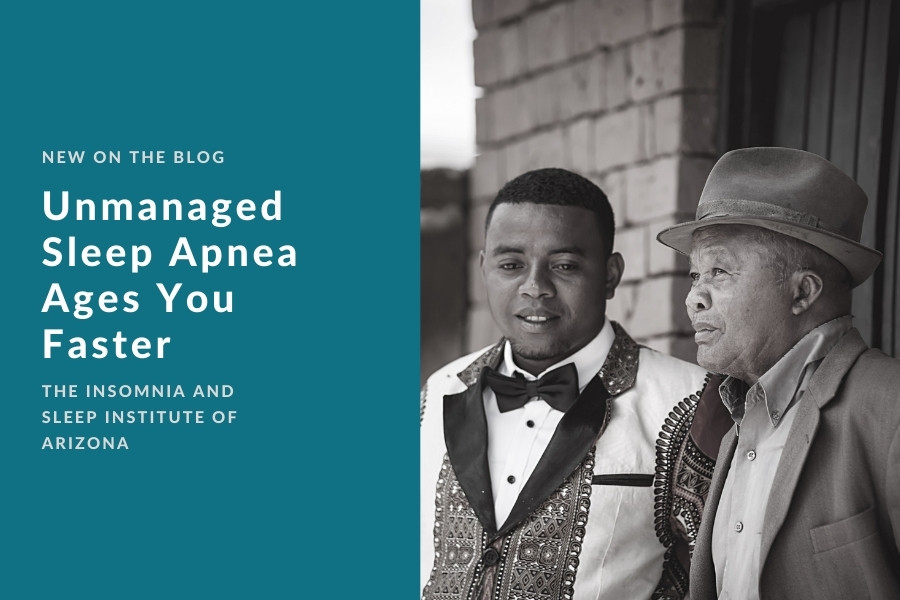There are many reasons to address your sleep apnea, especially since it is connected to nearly countless co-morbidities including cardiac events and diabetes. However, a recent study has also revealed how sleep apnea, when unmanaged, makes you age faster—but the good news is that treating it can reverse this acceleration. The Insomnia and Sleep Institute of Arizona can diagnose and treat all types of sleep disorders, including both obstructive sleep apnea (OSA), the most common kind, and central sleep apnea (CSA). Here, patients are under the care of triple board-certified Dr. Ruchir P. Patel, the “Top Doc” in the area for the last six years, and Board President of the Maricopa County Medical Society. From your initial consultation with a sleep specialist, you will be working with experts who can diagnose your sleep condition.
The study, published in Science Daily, was interested in how just one year of CPAP treatment changed a person’s health. The authors knew, of course, that OSA affects 22+ million people in the U.S. and that it has links to stroke, hypertension, heart attack, and a host of other issues. However, they discovered that untreated OSA speeds up the biological aging process. Researchers at the University of Missouri School of Medicine tested the blood of participants to analyze DNA, then used an algorithm to determine the person’s biological age. When someone’s biological age surpasses their chronological age, it is called “epigenetic age acceleration.” This, unsurprisingly, leads to an increased rate of chronic disease progression and mortality.
The OSA Age Link
OSA isn’t the only condition that has been linked to age acceleration. One of the researchers notes, “it can be caused by a variety of environmental factors like smoking, poor diet, or pollution.” This means it’s quite common for those in Western countries to experience epigenetic age acceleration—but why do so when you can avoid it? In some cases, there is only so much you can do about pollution (such as if you live in a polluted metro). However, OSA is one factor that you can have complete control over with the help of a sleep specialist.
The study included 16 non-smoker adults, all diagnosed with OSA. They were compared to a control group of people without OSA. Next, the OSA group underwent CPAP therapy for one year, and then were re-tested for their baseline blood levels. Those who adhered carefully to CPAP usage revealed a “deceleration of the epigenetic age,” according to the researchers. Those in the control group, without OSA and thus without CPAP therapy, did not have any change in their biological age (beyond aging the expected year). The research team concluded, “Our results suggest that biological age acceleration is at least partially reversible when effective treatment of OSA is implemented.”
Reversing Your OSA-Induced Aging
The keyword here is “effective.” Many patients do not use their CPAP 1) as they should and/or 2) every time they sleep. There is a myriad of reasons for this, the most common being ill-fitting equipment. It may take some work with your sleep specialist to find the right CPAP materials for you. When this occurs, adherence becomes much easier. In fact, many patients who use CPAP correctly feel like they can’t sleep well without it (because they can’t). The researchers found that CPAP must be used at least four hours every night for optimal results.
In the rare event that CPAP therapy really is not suitable for a particular patient, other options such as the Inspire implant may be used. The Insomnia and Sleep Institute has the ability to offer this technology, which is installed in an outpatient procedure at a nearby OR, and then set up and monitored at The Insomnia and Sleep Institute. As for other groups, such as children, more testing and analysis are needed. Anyone of any age can struggle with sleep apnea, but it is much more common in adults. However, we treat patients as young as two years old because everyone needs and deserves good sleep (particularly children). However, it is usually adults who struggle with OSA.
If you think you or your child has sleep apnea, the sooner you connect with a sleep specialist, the sooner you can get help (and turn back the clock). Call The Insomnia and Sleep Institute today, or complete the online form to set up your consultation. No referral is needed.





